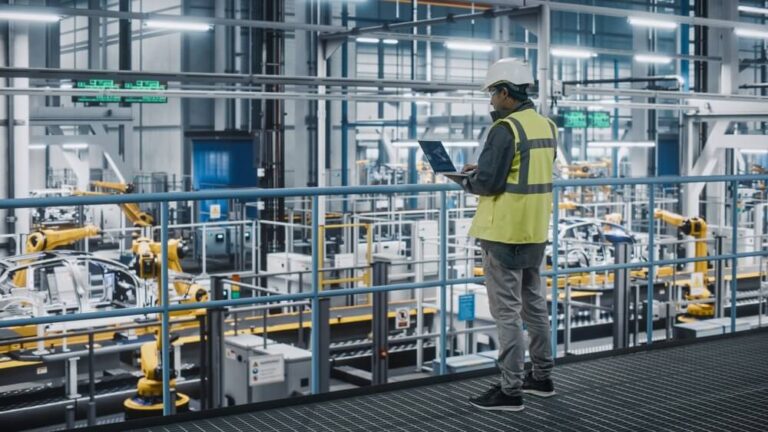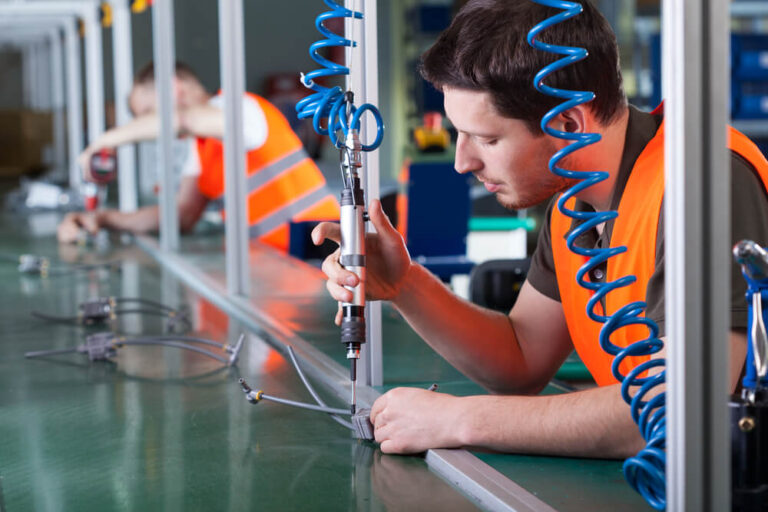More material goods are being manufactured than ever before. However, the United States manufacturing job market has been on a steady decline since the early 2000s. Economists have varying opinions on the real reason (or reasons) why the U.S. has lost so many manufacturing jobs.
At Austin Nichols, we working with individuals to find manufacturing jobs in Kansas City. Here, we want to provide insights into the various reasons we believe there are fewer manufacturing jobs in the U.S. than in the past and how we can combat this loss.
1. Many Manufacturing Jobs Have Become Automated
Manufacturing jobs are on the decline because there is more automation in the industry every year. Technology has helped make manufacturers much more efficient in producing products. However, because technology has made things more efficient, there are fewer jobs in the field. With the help of automation, one person can do a job that may have required multiple workers in the past.
Industrial robots have been used in mass production since the 1960s. This automation has saved companies large sums of money and increased productivity. After all, robots do not need breaks, allowing them to run 24/7. Automation is expected to keep growing, as well.
2. Decreasing Costs Associated with Automation
One reason manufacturing jobs are being replaced by automation is the decreasing costs of integrating automation into manufacturing facilities. The costs of robots and automation is expected to drop by 65 percent by 2025. Because automation is far less expensive than employees, we will continue to see manufacturing jobs decrease in numbers.
A study by MIT suggests that 57 percent of all manufacturing could be fully automated in the next 20 to 25 years, which means manufacturing jobs will continue to deplete if we don’t come up with a solution.
3. Manufacturing Jobs Peaked In the 70s
U.S. manufacturing peaked in the late 1970s, with nearly 20 million people in these jobs. However, between 1980 and 2017, the U.S. lost roughly 7.5 million manufacturing jobs. Starting in the late 70s and 80s, more and more people began to pursue higher education, leading them to seek more desirable jobs. People pursuing higher education combined with automation taking over the industry both were cause for the manufacturing job market to decline steadily since its peak in 1979.
4. Manufacturing Jobs Have Not Grown at the Same Rate as the Population
The U.S. population has more than doubled in the last 70 years. In 1949, the population was 149.2 million, while today it is 331 million. Despite the population growth, the same number of people worked in manufacturing jobs in 2018 as 1949.
According to the U.S. Bureau of Labor Statistics, the manufacturing industry lost 7.5 million jobs since its peak in 1969, with the most significant drop between 2000 and 2017. Therefore, while the U.S. population grew 9.7 percent between 2000 and 2010, there were much fewer manufacturing jobs for the workers to fill.
5. Trade with Foreign Countries
It is common knowledge that many U.S. companies outsource their manufacturing to other countries. Since China began participating in the World Trade Organization in 2001, Chinese imports to the U.S. also quadrupled between 2001 and 2004. The main reason companies do this is because of the cost savings. China has very few labor laws and a low minimum hourly wage, which means companies pay employees a lot less for more hours of work.
The trade war has caused about 2.4 million manufacturing jobs to move from the U.S. to China. While many manufacturing jobs have moved overseas, automation is still the primary cause of the manufacturing job market decline.
How to Combat the Loss of Manufacturing Jobs
Manufacturing is an integral part of the U.S. economy. Manufacturing jobs have the highest number of workers without college degrees. So, how is the U.S. supposed to bounce back from the dramatic decline in manufacturing jobs? Well, the answer is complicated. Part of the solution is revising trade agreements, which are in the hands of our elected officials.
However, there are things that WE can do to help combat this loss. First, we can educate and retrain those in manufacturing jobs. If we have more highly trained individuals overseeing manufacturing plants, it will only increase their productivity.
Another way to increase manufacturing jobs is through innovation. Whether for individual use or large-scale application, new technology and products can open up doors in the world of manufacturing. While there is still a chance that companies will choose to outsource manufacturing to other countries, there may be opportunities for the country to reward organizations for keeping the jobs in the U.S.
At Austin Nichols, our professional recruiters specialize in placing individuals in engineering, supply chain, and manufacturing jobs in Kansas City. Please contact us at 816-471-5575 if you have any questions or to start working with a recruiter today.










